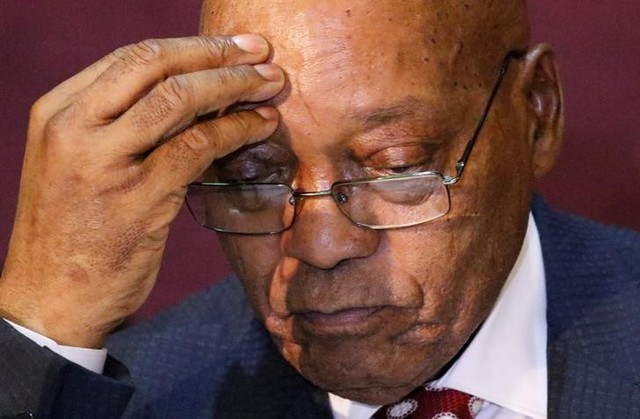South Africa’s Zuma faces no-confidence vote in corruption crisis


South Africa’s Jacob Zuma faces a no-confidence vote in parliament next week with his presidency mired in crisis, after investigators documented allegations of government corruption and thousands of people took to the streets to demand he resign.
The vote was called by the main opposition on Thursday following a report by the country’s anti-corruption watchdog calling for a judicial inquiry into allegations of influence-peddling in the ANC government.
The report was finally released after the president withdrew a court bid to delay its publication in the face of mass public protests. Police used stun grenades and water cannon to disperse protesters in Pretoria carrying “Zuma must go” placards.
Mmusi Maimane, leader of the main opposition Democratic Alliance (DA), told a news briefing in Cape Town that the no-confidence debate and vote was scheduled for Nov. 10.
“This motion should not be viewed as a partisan motion – we do not see it as a DA motion,” he said. “I know there are ANC MPs and cabinet ministers who have had enough. They have an opportunity to actually do something about their anger next week Thursday.”
Zuma has survived his two previous no-confidence votes this year, largely backed by the support of his ANC (African National Congress) which controls about two-thirds of the assembly.
A senior party official told Reuters that ANC lawmakers were unlikely to break ranks and support the motion this time round.
But there have been widening fissures in the ruling party this year and growing discontent with the scandals that have plagued Zuma’s presidency and played a role in the ANC suffering its worst electoral losses since the end of apartheid in municipal polls in August.
The ANC’s chief whip in parliament, Jackson Mthembu, last month urged Zuma to lead senior party officials in quitting their posts, saying fraud charges levelled against Finance Minister Pravin Gordhan were an abuse of power. The charges against Gordhan have since been dropped.
Since taking office in 2009, Zuma has survived several corruption scandals. But the watchdog’s report, public protests and no-confidence vote pile more pressure on the 74-year-old to resign than at any other time – and if he stays in power, they could embolden his rivals within the ANC to challenge him.
The ANC said in a statement the report was a basis for the country to discuss the allegations and deal with its outcomes.
GUPTA FAMILY
The 355-page report by the constitutionally mandated watchdog – the Public Protector – is titled “State of Capture. It focused on allegations that the Gupta family of business tycoons influenced the appointment of ministers, and called for an investigation into whether Zuma, some of his cabinet members and some state companies acted improperly.
It stopped short of saying crimes had been committed, saying it lacked the resources to reach such conclusions. But it said a judge must investigate a scandal that has rattled markets in Africa’s most industrialised economy and increased the risk of ratings downgrades.
Zuma denies granting undue influence to the brothers, who run a business empire from media to mining, or anyone else.
His office has said he is considering the report and reserves the right to challenge its findings in court.
The Guptas have denied seeking influence. They are studying the report and will defend themselves at the planned judicial inquiry, said their lawyer Gert van de Merwe.
“We will participate and we will participate comprehensively,” he told eNCA television, adding that the family had not been given the chance to give evidence to the Public Protector.
The report raised questions over coal deals between South Africa’s sole power utility Eskom and a Gupta-owned firm.
The chief executive of Eskom, who was adversely mentioned in the report, said he was not given an opportunity by the watchdog to give his version of events.
“I was never given an opportunity to explain myself by the Public Protector,” said an emotional CEO Brian Molefe, adding that the anti-graft watchdog had painted him “with a corruption brush” without any basis for the allegations against him.
Zuma met Zimbabwean President Robert Mugabe in Harare on Thursday to sign bilateral agreements, and Africa’s oldest leader told him with a chuckle: “I am happy you are in one piece in spite of what the papers are writing every day.”
Reuters